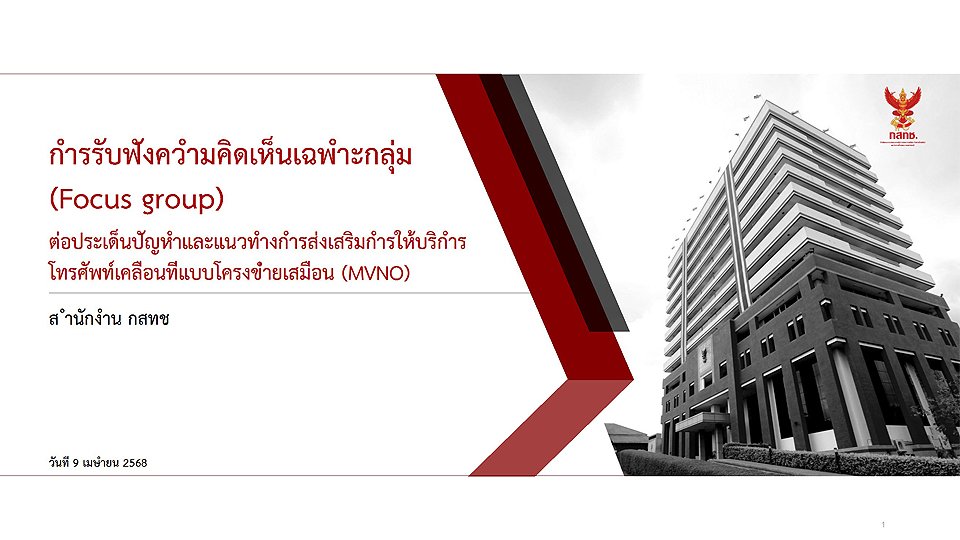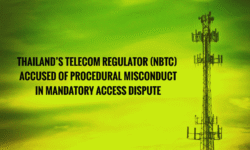MVNO Services Comments on NBTC’s MVNO Focus Group Hearing
- April 26, 2025
- Posted by: Allan Rasmussen
- Category: MVNO News

NBTC’s presentation for the MVNO Focus Group Hearing April 2025
MVNO Services Co., Ltd., has submitted the following comments to the pre-written agenda and question raised by the NBTC, at the Focus Group meeting regarding “issues and approaches to promote mobile virtual network operator (MVNO) services” in Thailand.
The MVNO Focus Group meeting took place on the 9th of April 2025 at the NBTC. Participants included representatives from the two mobile operators (AIS and TRUE), National Telecom (NT), NBTC office, and the only three remaining MVNOs in the country.
NBTC’s agenda and presentation for the MVNO Focus Group meeting is available here (PDF)
The option to submit written comments after the meeting was also made as a pre-written agenda form by the NBTC with 8 items/questions with only the last item (Other) being open for other issues, than those predefined by the NBTC.
At the meeting, we raised the question, why the meeting was not publicly announced, as we do think the issues has the interest of the public, as well as several organizations (Thailand’s Consumer Council, Joint Foreign Chambers of Commerce, etc.) given the lack of competition and related issues in the Thai telecom sector today.
We also questioned the value and lack of outcome from this, and the other annual meetings that have taken place before and requested a summary.
We have therefore decided to make our written comments to the NBTC available to the public. You can read our comments to NBTC’s predefined items/questions (marked with (NBTC) and a number), below – or you can download the same, in the comment form submitted to the NBTC (PDF)
(NBTC) 1. Issues regarding Full MVNO license application and service characteristics
ความคิดเห็นต่อประเด็นปัญหาและแนวทางการส่งเสริมกำกับดูแลตามกฎหมายที่เกี่ยวข้องกับการให้บริการ โทรศัพท์เคลื่อนที่แบบโครงข่ายเสมือน (MVNO)
๑. ประเด็นการขอรับใบอนุญาตและลักษณะในการให้บริการ (Full MVNO)
(MVNO SERVICES) The Full MVNO model is a well-established model recognized by regulators worldwide. It is characterized by the extent of network infrastructure and operational control the MVNO possesses. Unlike Thin or Medium MVNOs, a Full MVNO owns and operates significant core network elements i.e. HLR/HSS, MSC, GGSN, PGW, SMSC, etc., granting it greater autonomy and flexibility in service offerings.
Due to the investment in, and control of its own infrastructure, Full MVNOs achieves more favorable wholesale rates with host MNOs than Thin or Medium MVNOs.
It is therefore important for the NBTC to not only concentrate on the license part for Full MVNOs but also the wholesale rate model that comes with it, such as achieving minimum retail minus 50% or equal in other models.
In addition, Full MVNOs and MVNAs are typically allowed to establish their own national and international roaming agreements, consistent with the capabilities of a Full MVNO.
The NBTC also needs to ensure that an MVNO applying for – and receiving a Full MVNO license, indeed operates as a Full MVNO and does not solely use the designation to secure more favorable wholesale rates
(NBTC) 2. Issues regarding: Negotiation, contract drafting, and contract compliance, including the initial readiness required by both the service buyer and seller to negotiate a Mobile Wholesale Service Agreement, in order to ensure completion within the legal deadline.
๒. ประเด็นการเจรจา การทำสัญญา และการปฏิบัติตามสัญญา ได้แก่ ประเด็นความพร้อมเบื้องต้นที่ผู้ซื้อ บริการและผู้ขายบริการจำเป็นต้องมีในการเจรจาทำสัญญาขายส่งบริการโทรศัพท์เคลื่อนที่ เพื่อให้สามารถ ดำเนินการแล้วเสร็จภายในระยะเวลาที่กฎหมายกำหนด
(MVNO SERVICES) This is arguably the most critical issue raised, as it has already as it has already led to the closure of MVNOs. Furthermore, the remaining three MVNOs may face business cessation when National Telecom (NT) returns its spectrum this year.
The fact that these fundamental barriers to efficient wholesale agreements are being brought to the forefront, after more than a decade of MVNO licensing activity, raises serious questions about the effectiveness of regulatory oversight during this period.
It is difficult to overlook the implication that the NBTC may have inadvertently neglected its duty to ensure that the numerous MVNOs, who have invested in licenses and presumably aimed to fulfill regulatory conditions, have been provided with a clear and accessible pathway to wholesale access from True and AIS, for over ten years.
The issuance of over 65 MVNO licenses without proactively establishing and enforcing a clear selection framework from the MNOs, shows a case of regulatory oversight. This delay in addressing these core issues has resulted in significant challenges, including the closure of MVNOs, job losses, the loss of national and international investment, fees to the NBTC, and the unrealized potential of the MVNO sector.
Compounding this issue is the apparent lack of follow-up and enforcement by the NBTC regarding its own MVNO access conditions imposed on the merger of TRUE and DTAC more than two years ago. This inaction represents a clear neglect of duty and undermines the credibility of regulatory commitments.
To address this long-standing problem and ensure a more equitable and competitive mobile market moving forward, we strongly urge the following:
- Immediate Enforcement of TRUE/DTAC Merger Conditions: The NBTC must immediately enforce the conditions related to MVNO access that were stipulated as part of the TRUE/DTAC merger approval.
- Spectrum Auction Qualification: TRUE should not be qualified as a bidder in any upcoming mobile spectrum auction or allocation until they fully comply with their existing license conditions regarding MVNO access AND the specific MVNO access conditions mandated as part of the TRUE/DTAC merger by presenting a copy of wholesale agreements with at least one MVNA and one MVNO.
Furthermore, AIS should also be required to demonstrate a commitment to MVNO access, consistent with the requirements outlined in its license conditions for over 10 years, by providing a copy of at least one signed wholesale agreement with at least one MVNA and one MVNO as a condition for spectrum auction participation.
This measure would directly incentivize the dominant MNOs to actively engage with and facilitate access for MVNAs and MVNOs, demonstrating a tangible commitment to wholesale service provision before acquiring further spectrum resources. This proactive step can help rectify past oversights and foster a more balanced and competitive landscape.
Moving forward, it is imperative that the NBTC not only identifies these shortcomings but also implements robust and timely measures to rectify them. This includes enforcing its own regulations that mandate clear, transparent, and non-discriminatory selection frameworks from the two MNOs.
Furthermore, a more proactive and ongoing monitoring mechanism is needed to ensure that wholesale negotiations proceed efficiently and that licensed MVNOs have a fair opportunity to access the market and compete effectively.
The lessons learned from the past decade should inform a more stringent and forward-looking regulatory approach to foster a healthy and competitive MVNO ecosystem that ultimately benefits consumers, investment in the country, digital transformation and promotes innovation in the mobile telecommunications market.
Regarding obligation mentioned in NBTC’s presentation for the Focus Group Meeting. It is important to notice that a MVNA cannot have the same obligations as a MNO, By its very nature, a MVNA does not have the access to manage the radio access network nor spectrum.
An MVNA is an entity that, as a middleman, takes on costs and risks associated with buying from MNOs and selling to MVNOs, and is therefore entitled (like any other company) to refuse clients, i.e., if the MVNA does not believe the MVNO client is capable of adhering to its business plan, securing payment and continued funding, or if the client lacks the necessary skillset to operate an MVNO, which could otherwise harm the MVNA, MNO, and end-users.
Likewise, the MVNO can also decline the MVNAs offer, and request access to a MNO instead.
(NBTC) 3. Issues regarding the cost of purchasing Wholesale Services from the mobile operators (MNO), including the appropriateness of determining the Wholesale Service compensation to the MNO.
๓. ประเด็นด้านต้นทุนในการซื้อบริการขายส่งบริการ MVNO ได้แก่ ประเด็นความเหมาะสมในการกำหนด ค่าตอบแทนการขายส่งบริการโทรศัพท์เคลื่อนที่
(MVNO SERVICES) It is noteworthy that the issue regarding the cost of purchasing wholesale services from the MNOs and the appropriateness of determining compensation for mobile wholesale services, is a question that the NBTC itself has been asking for the past 3 years, yet no progress or tangible outcomes have seem to have materialized.
The main concern remains that MNO providers offer retail prices lower than the wholesale prices to MVNOs, which is a significant obstacle to competition. Therefore, we submit this for your consideration and urge you to expedite the resolution of this issue, as it is a matter that the NBTC itself has repeatedly raised over a long period.
We supports commercial negotiation as the overarching principle for MVNO provisioning. MVNO arrangements must be a win-win for both the MNO, MVNA, MVNO and consumers.
The NBTC suggested retail minus 30 approach, was at its introduction 19 years ago appropriate for the technology (2G/3G) available at the time, and in cases where an MVNO would be a pure reseller of the MNOs own price plan, with voice calls and SMS as the leading services back then.
Retail minus and Units of Usage (per Minute/Megabyte/SMS) have historically been the most common when calculating MVNO wholesale pricing. However, this approach has lost its relevance with the change from voice as the dominating service to a data-driven environment.
Much has changed from the days of voice calling being the dominating service, for example:
- The arrival of 3G/4G/5G made data the dominating service in most markets and as a consequence prices on data have dropped.
- The introduction of messaging apps resulted in SMS/MMS declining significantly, similarly Wi-Fi calling and VoLTE has also changed the interest and pricing on Voice services.
- IoT and M2M continues to change wholesale pricing models, as most of these are data-only.
- Furthermore, some of these services, might be huge in quantity but not in data usage – and/or no need for 24-hour access but can be processed during low capacity hours on the network.
- Cloud and Open RAN have provided lower costs for both the MNO and MVNA/MVNE/MVNO.
- Different MVNOs, bringing different elements themselves to the setup with the MNO (i.e. Full MVNO), as well as different service propositions (No two MVNOs are alike).
- 5G slicing demands another price structure, as it is a defined slice, versus the whole network.
- The introduction and growth of eSIM has changed the cost structure (i.e. distribution)
In addition, MVNOs today (Medium, Enhanced, Full) are:
- investing significantly in, and providing some of their own components, taking on a higher level of risk than with the old form of wholesale agreement;
- have its own pricing freedom and plans;
- the types of commercial agreements between MNO/MVNA and MVNO have evolved.
The purpose of introducing MVNO competition into a market is to foster retail level competition and innovation, as described in NBTC’s old and updated notification on MVNOs. However, by its very nature, if the MVNO is locked into a wholesale price which reflects the host operator’s retail minus 30, it creates a de facto limit for the MVNOs potential to discount retail prices, innovate new pricing and bundles etc., and thereby killing the effect MVNOs should have on competition and price level in the market, as it merely becomes a reseller of the host operator.
In addition, with the TRUE DTAC merger, as it includes an operator whose associated companies are sitting on 95+ percent of the retail market, the cost savings the MVNOs can make in sales and distribution are further reduced in the supply chain.
MNOs can move the costs between different parts of their retail prices. When the retail minus approach is adopted on voice calls to MVNOs, there is a considerable opportunity for the host MNO to increase its retained margin on call types provided to MVNOs and thus discriminate against them.
MVNOs need significant price flexibility in order to respond quickly to emerging technical and product developments and to offer customers innovative and segmented services at the earliest opportunity.
MVNOs are actually buying the excess capacity (waste product), that the MNOs produce every day, which is typically around 40%. The payment MVNOs provide for such, is pure (and additional) profit to the mobile network operators and in addition help the MNOs with their Environmental, Social, and Corporate Governance (ESG) by offsetting their wasted capacity.
We draw the NBTC’s attention to the issue of the MNOs offering unlimited data to end-users while the MVNOs still have to pay per MB to the MNOs.
If an MNO is acting in bad faith or engaging in any form of anti-competitive conduct, or if after a reasonable period (1 month maximum) of in good faith negotiations, a commercial agreement cannot be reached between the parties, it would be in the interest of the NBTC to intervene and assist the parties or, if necessary, adjudicate and make a determination appropriate in each circumstance or case.
The latter is important as there is a difference between the MNOs (Significant Market Power, Spectrum availability, Coverage), the MVNOs (Thin, Medium, Full) and the service offered (End users or M2M).
The appropriate solution from NBTC in case of dispute should be a backstop regulation in the event of no commercial agreement, which should encourage suitable wholesale agreements to be concluded.
By way of example, the NBTC should apply a number of tests, as used by the Norwegian National Telecom Regulator (NKOM) to determine the appropriate solution between the disputing parties including:
- Testing if the MNO could operate profitably itself, if it used the disputed wholesale price agreement;
- a package-specific margin-squeeze test to ensure that MVNOs can operate profitably with a competing retail offer;
- a segment-specific margin-squeeze test to ensure that MVNOs can operate profitably with a portfolio of current (flagship) retail offers.
Other telecom regulators have already done their job on a pricing framework based on standards such as: the pricing of applicable network elements the MVNA/MVNO brings, and other relevant dependencies.
In example, as shared with the NBTC during the MVNO Focus Group Meeting, the Nigerian Communications Commission (NCC) has determined a Pricing/Revenue share structure that includes the different tiers of MVNO – or type of MVNOs:
- Tier 1 MVNO (reseller) with own VAS platform and SMS-C: 25% to MVNO / 75% to MNO.
- Tier 2 MVNO (Thin MVNO) with own VAS, SMS-C, Billing & Provisioning, IN & HLR: 30% to MVNO / 70% to MNO.
- Tier 3 MVNO (Medium) with own VAS, SMS-C, Billing & Provisioning, IN, HLR & Core: 40% MVNO / 60% to MNO.
- Tier 4 MVNO (Full MVNO/MVNA) with own VAS, SMS-C, Billing & Provisioning, IN, HLR, Core: 50/50.
A note regarding Revenue Sharing: It is worth noting a problem with revenue sharing. A MNO entering into a clear revenue share without any other conditions risks sharing lack of profit. For example in Thailand between a postpaid MVNO and National Telecom (NT) where the MVNO has retailed the price so low that the MNO is losing on the deal while the MVNO does not.
(NBTC) 4. Issues regarding the regulatory fees (Regulatory Cost) the MVNA/MVNO has to pay to the NBTC, including the Telecommunications Business License Fees and Telecommunications Numbering Fees.
๔. ประเด็นด้านค่าธรรมเนียมการกำกับดูแล (Regulatory cost) ได้แก่ ประเด็นการปรับลดอัตราค่าธรรมเนียม ใบอนุญาตประกอบกิจการโทรคมนาคม และอัตราค่าธรรมเนียมเลขหมายโทรคมนาคม
(MVNO SERVICES) We suggest the NBTC eliminates its double and triple fees on service. As it is today, the MNO has to pay the annual revenue fee to NBTC from selling airtime to the MVNA. The MVNA also pays the annual revenue fee to the NBTC from selling the same airtime to the MVNO, who also pays the annual revenue fee from selling airtime to end-users.
As the MNO, MVNA and MVNO each have to pay the license fee, the same mobile service (airtime) ends up incurring triple fees when it arrives at the MVNOs and the consumers. This causes a serious price and margin disadvantage to the MVNO and disbenefits to the end-users.
Same issue occurs, albeit double fees, if a MVNO is buying wholesale directly from the MNO (without a MVNA).
We suggest that the MNO pays the license fee, as it is the primary beneficiary of the wholesale arrangement with no added costs, as these are now held by the MVNA/MVNO.
.
(NBTC) 5. Measures to promote and regulate MVNO services, including:
5.1 Issues regarding the feasibility of applying specific conditions and measures for mergers to promote MVNO services.
๕. มาตรการส่งเสริมและกำกับดูแลการให้บริการ MVNO ได้แก่
๕.๑ ประเด็นความเป็นไปได้ในการนำมาตรการเฉพาะสำหรับการรวมธุรกิจที่กำหนดขึ้นเพื่อส่งเสริมการ ให้บริการ MVNO มาใช้บังคับ
(MVNO SERVICES) We have had these MVNO meetings 3-4 times now – Which NBTC department is responsible for the meetings? What was the outcome of the last meetings? Did anyone summarize the inputs from the meetings and the written comments and to whom was this presented? Can we have a copy of the summary from last time?
In 2023, NBTC Tele Commissionaire Khun Sompop Purivigraipong said that, the important issue and the policy of coming to work for the NBTC is to promote the creation of MVNOs. Can we hear some examples of what has been done to do so? Why has Khun Sompop Purivigraipong, as a Commissionaire for Telecom not participated in the MVNO hearings?
What are NBTC’s KPIs regarding MVNA/MVNOs?
What happened to NBTC’s “urgent policies for MVNOs” presented in 2023. For example “one-region-one-MVNO”?
(NBTC) 5.2 Issues regarding the feasibility of defining specific user segments for MVNO service providers.
๕.๒ ประเด็นความเป็นไปได้ในการกำหนดกลุ่มผู้ใช้บริการ (Segment) เฉพาะ ให้แก่ผู้ให้บริการ MVNO
(MVNO SERVICES) We would be very interested in NBTC sharing the information they have regarding demographic for various segments and welcome such a service.
(NBTC) 5.3 Issues regarding the feasibility of applying the Thailand Independent Market Operator (TIMO) business model to promote MVNO services.
๕.๓ ประเด็นความเป็นไปได้ในการนำแนวคิดการดำเนินธุรกิจรูปแบบ Thailand Independent Market Operator (TIMO) มาใช้เพื่อส่งเสริมการให้บริการ
(MVNO SERVICES) Firstly, we believe the NBTC’s characterization of TIMO requires immediate correction. TIMO is not a business model. It is an untested theoretical concept originating from an U.S academic who, lacks a comprehensive understanding of the intricacies of the Thai telecommunications market, and the practical experience in the complexities of MNO, MVNA, MVNE, MVNO wholesale operations.
Our specific concerns regarding the introduction of TIMO are as follows:
- Lack of Proven Track Record: TIMO remains a purely theoretical concept with no demonstrated success or real-world application within the telecommunications industry globally.
- Introducing such an unproven theory will only create further delays and uncertainty in the Thai mobile market, hindering crucial investment and impede service expansion, negatively impacting existing MVNAs and MVNOs before the NBTC realizes that TIMO cannot be used.
- The TIMO theory, potentially suitable for the energy sector, is not applicable to the heterogeneous nature of telecommunication. The heterogeneous and dynamic nature of the telecommunications sector differs significantly from other industries, such as energy, where the underlying principles of TIMO have been conceived.
- The NBTC must focus on effectively enforcing existing access regulations rather than introducing unproven and unknown theories that will only cause further delays.
- We suggest the NBTC conduct a more detailed due diligence on the TIMO consulting company. For example, the primary proponent of the TIMO theory has not been able to mention a single case story with TIMO. Furthermore he mentions that TIMO had been endorsed and cited by “Telecommunication Policy”. However, he fails to disclose that the Editor in Chief of Telecommunication Policy, who wrote the ‘endorsement,’ is a partner of the very consulting group trying to sell TIMO to the NBTC.
- While the initial TIMO concept and basic API code may be presented as “free,” the lack of practical application suggests a high likelihood of the NBTC requiring extensive and prolonged consultancy from the theory’s originator for implementation and ongoing management.
We strongly recommend that the NBTC prioritize the adoption and effective enforcement of proven wholesale models that have fostered successful MVNA/MVNO ecosystems globally. The current wholesale models utilized in over 100 countries with more than 2000 thriving MVNA/MVNOs have a proven track record of success. Thailand should adopt these established standards rather than serve as an experimental ground for an unproven theory.
(NBTC) 6. Other Comments.
๖. อื่นๆ
(MVNO SERVICES) We are compelled to express our profound disappointment and urgent concerns regarding the NBTC’s apparent lack of effective enforcement of its own regulations concerning MVNA/MVNO access to the networks of AIS and TRUE/DTAC. This critical issue has been repeatedly raised in our prior engagements over several years, yet tangible progress remains absent.
Specifically, we note the following critical points:
Failure to Enforce Access Mandates: The NBTC has, to date, failed to ensure mandated access for MVNAs and MVNOs to the infrastructure of AIS and TRUE/DTAC. The fact that at least one MVNA and one MVNO have been compelled to initiate dispute proceedings against the two MNOs underscores this regulatory inaction. The NBTC’s apparent lack of intervention in these disputes is deeply concerning.
Neglect of TRUE Merger Conditions: The conditions imposed upon the merger of TRUE have been neglected by the NBTC for over two years. This lack of oversight further exacerbates the challenges faced by MVNAs and MVNOs seeking access to the merged entity’s network. Simultaneously, the NBTC continues to issue MVNA/MVNO licenses without ensuring the fundamental prerequisite of network access is available.
This inconsistency undermines the viability of these licensees and the overall development of a competitive mobile market. We demand immediate and decisive action from the NBTC to enforce its MVNO/MVNA access regulations and the conditions of the TRUE merger.
The time for deliberation has passed; concrete regulatory action is imperative. The current state of the MVNO sector, with most entities going out of business, is a direct consequence of this regulatory deficiency. The remaining handful of MVNAs and MVNOs may indeed need to consider formal dispute proceedings against the NBTC for neglect of its statutory duties.
Concerns Regarding the “MVNO Focus Group” Consultation Timeline and the Spectrum Auction: The timing of the comment deadline for the “MVNO Focus Group,” set a mere four days after the NBTC board’s scheduled decision on the Spectrum Auction, is highly problematic.
This timeline effectively prevents the board from considering vital feedback from MVNAs and MVNOs in their crucial decision-making process regarding the auction.
It is essential that the perspectives of MVNAs and MVNOs are explicitly considered in the context of the spectrum auction, particularly given that the anticipated bidders, AIS and TRUE, have not yet provided adequate access to their networks.
As a concrete measure, we propose that eligibility to participate in the spectrum auction be contingent upon providing evidence of a wholesale agreement with the minimum of one MVNA and one MVNO.
Lack of Clarity Regarding NT’s MVNO and Consumer Base: The recent announcement by NT (National Telecom) that it can no longer support MVNOs raises critical questions about the NBTC’s plan for the affected MVNOs and their consumer base. We require urgent clarification on the NBTC’s strategy to mitigate the impact of this development and ensure continuity of service and consumer protection.
One of the participants at the MVNO Focus Group meeting raised an issue regarding a foreign entity selling SIM cards in Thailand without a MVNO license. What measures has the NBTC taken on this issue?
In conclusion, we urge the NBTC to move beyond mere discussion and take immediate, concrete action to enforce its existing regulations, particularly concerning MVNA/MVNO access.
The continued failure to do so is stifling competition, hindering market development, and jeopardizing the viability of MVNAs and MVNOs. The NBTC must transition from being a “paper tiger” to an effective regulator that ensures a fair and competitive telecommunications landscape in Thailand.
Latest Posts
NBTC Accused of Procedural Misconduct in Mandatory Access Dispute
MVNO Services has filed a petition alleging procedural flaws in NBTC handling of mandatory MVNA network access dispute with True Move H
October 24, 2025NBTC is inviting MVNOs to a focus group meeting on MVNO issues (again)
To revise its MVNO regulations, the NBTC is inviting MVNOs to a focus group meeting to discuss key issues like licensing, costs, and promotion
April 3, 2025



